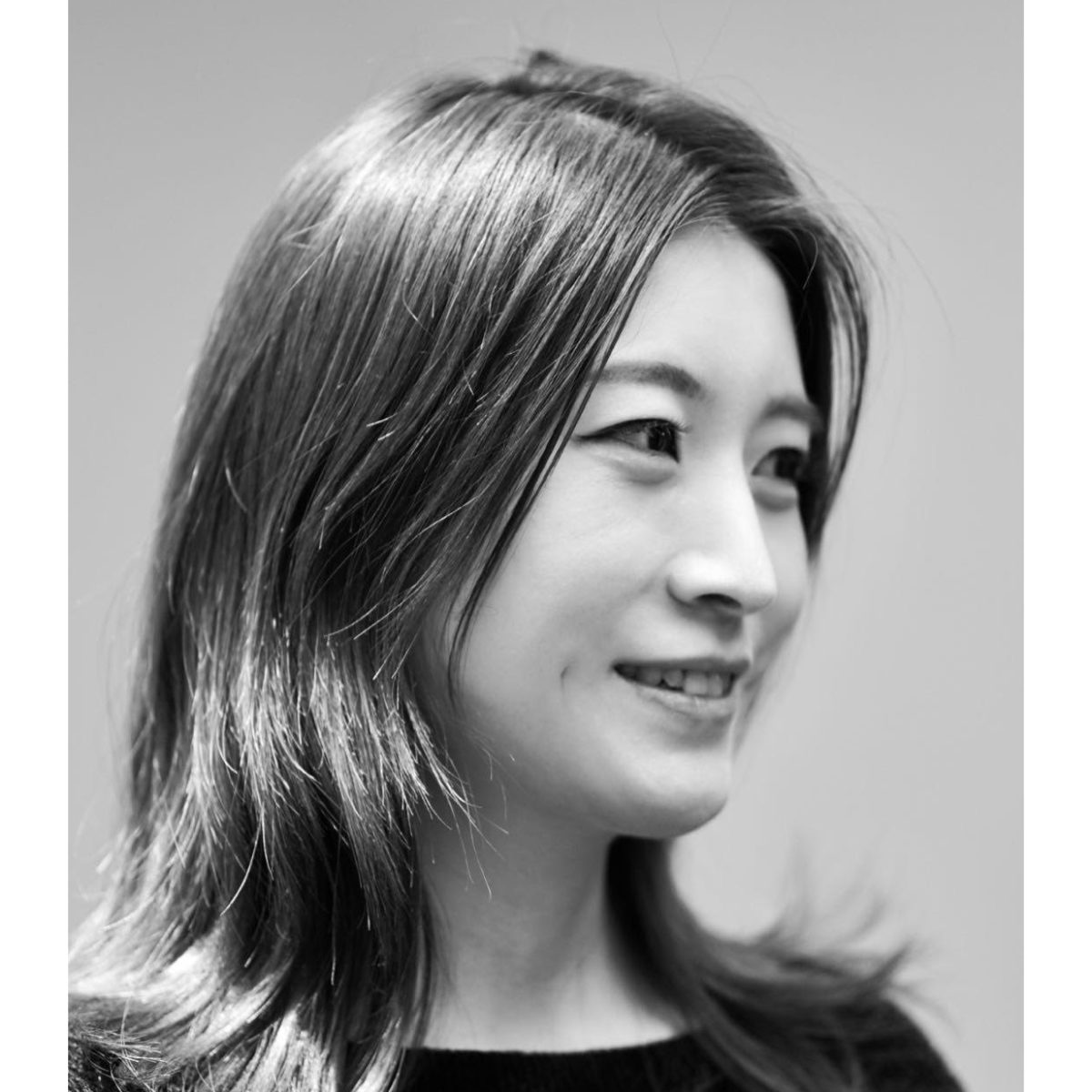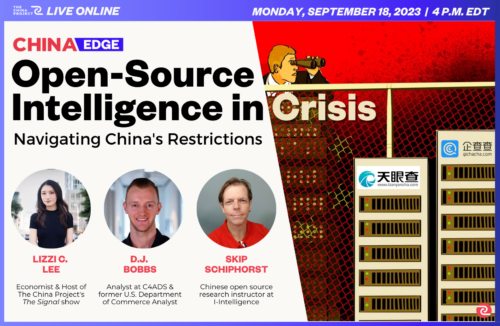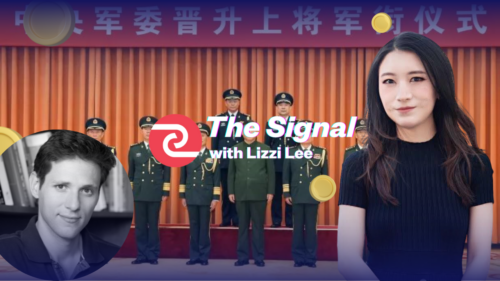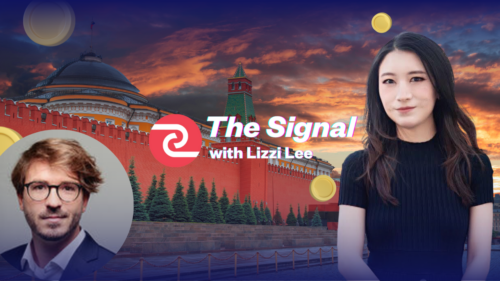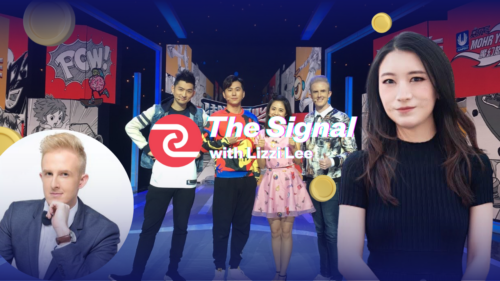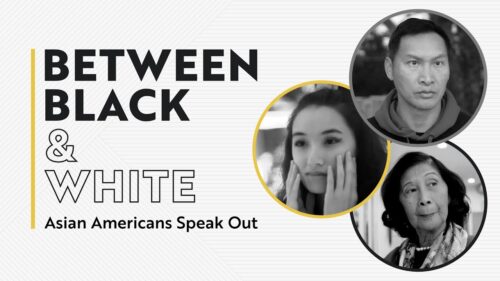The most underreported story about China | The Signal with Lizzi Lee
Jacob Dreyer is a writer and editor based in Shanghai, where he has resided for over a decade. Jacob shares his thoughts on China's views of the United States and some of the overlooked developments in China.

Below is a transcript of the video:
Lizzi Lee: Hello and welcome to this episode of Live with Lizzi Lee, powered by The China Project. Today, we have a very special guest, Jacob Dreyer. Jacob, I wonder if you can tell our audience a little bit about yourself, your background, and how it led you to spend over a decade in Shanghai.
Jacob Dreyer: Sure. Thanks, Lizzi! I’m from Charlottesville, Virginia. And I grew up always wanting to be a writer, but I have no connection with China, really, or I didn’t grow up having one. I’m not ethnically Chinese, no East Asian family members, or anything like that. I went to college also in Virginia – William and Mary – and when I graduated in 2008, I came to Shanghai for what I thought was just kind of like a gap year adventure sort of thing. Now, what was interesting to me… so my father suggested I go to China because he had this kind of belief- I guess he got it from investing in the stock market – that China was the future, which some people in 2008 were starting to have. But what was interesting to me, even at the time was, it was a pretty niche thing for me to go to China in 2008. And my classmates reacted kind of like I said, I’m moving to Ethiopia or Brazil. “Oh, that’s cool. Hope you don’t get an upset stomach from the food there. You know, see around in Fairfax, Northern Virginia, sometime soon!”
And anyway, so I went to Shanghai. It was a really interesting experience for me, especially I grew up in and went to college in small towns in Virginia. When I came to Shanghai, it was very different and I was not sure if that was because it was China or a big city or what exactly the reason was. But anyway, my year was over and I went to graduate school in London at the Architecture Association because I kind of thought that I was really interested in the big city. I didn’t really get that it was a China thing. So I spent a year in London. That was great. I then came back to Shanghai in 2010 and spent another year in Shanghai. And I sort of was starting to realize how interesting China, the society was, and how few ways I had of finding out about it as a person who couldn’t read the Chinese language, which I could not. And so I decided, okay, you know, in my very kind of path-dependent way, I was like, the way to think about things for a living is to be a college professor.
So I should go to NYU in New York to do a Ph.D. in East Asian Studies because somehow studying architecture, I still didn’t feel like I was looking at the Shanghai skyline and it would all make sense to me. I didn’t understand it. I thought maybe it was because I don’t know Chinese.
So I was going to do graduate school with Zhang Xudong, who was running the East Asian Studies Department at that time. And, you know, for a variety of reasons, it didn’t turn into a Ph.D. because the East Asian Studies Department had its own internal issues. But I would say if you think about the situation of the humanities in US universities right now, I think a lot of places have their own specific issues, right? So for whatever reason, I kept feeling like in my early twenties I was trying to find a place for myself to meet my goal of just thinking about things and exploring New York and London. But I actually paradoxically found that Shanghai was the best place for me to do that. I could always make a living here. And then time went on. I had my adventures in my early twenties, including seeing Kaiser Kuo in the Great Leap brewery sometime in 2014. And slowly I remember when Mr. Trump got elected, it felt like such a shock.
But when I looked at my diary entries from 2014, and 2015, it felt like I wanted to return to the US, I was like, I’m just going to wait until things become sort of normal, whatever that means. But if I look back at 2014 or 2015, I have this clear sense of like something is not right at home. I really hope it gets right. And then on my 30th birthday, I never forgot. November 9th, 2016, Mr. Trump got elected. I was at the West Bund Art and Design Fair in Shanghai at that time. It was our morning because it was you guys’ evening. And some Chinese art collector kind of laughed at me and said “San shi er li”, which, as you may know, means at age 30, you know where you are in the world. And I was like, oh, at age 30, I know that I’m in the VIP whiskey bar of the Art Basel, the Shanghai Art and Design Fair, drinking the whiskey with some Indonesian guy because I’m so worried about Mr. Trump being elected president.
And I had gotten in 2015 a job at Palgrave, which is an academic publisher, and I’m just like the China guy. My job is to find Chinese intellectuals and publish their books. And at first, I was like, okay, cool. This is an interesting day job and I played around in the media and art world and stuff. But I think that a desire for stability, a sense of like, you know, the big flood is coming, let me make sure I’m on my boat kind of feeling. I started to take my job more seriously and also to sort of engage with what these Chinese intellectuals were writing more seriously.
During my time in graduate school, I was very much learning the kind of Marxism of the Ivy League variety. And then I started, you know, it’s strange because the Chinese government and the people who are its theorists, there is no secret to what they’re talking about.
They really publish voluminously on every topic you can imagine. But somehow what they’re saying is very boring. If you consider things like Chinese investments in Indonesian nickel mines and it seems a little more boring than, I don’t know. Gramsci’s theory of ideology in the Brooklyn housing market or whatever. But I started to really be like, okay, the world is really clearly changing and I think China has a lot to do with those changes. And I can observe, you know, like a stray cat that figured out that this is where the food comes every night. I can observe that when I’m in China and having a good life that I like and I can be healthy here and I have a job here and many of my friends in the United States, we’re not necessarily meeting all those or checking all those boxes. So I decided to really start engaging and try to learn as a grad student almost and continuing my education in my publishing job to just sort of be like, so what is really going on with all these 50-year-old men in Zhongguancun, which is the neighborhood in Beijing where the universities are.
What do they think about the world? Do I find that their view is coherent? And I think an important thing for me about the Chinese government, is whether what they believe is, “true” or not, their beliefs and the way they act on them can influence reality, whether it’s true or not. For example, is China a peacemaker in Iran? Well, no, that’s not true until they decide that it is true and then it’s true. So I started to sort of feel that what I first thought was a kind of random, kind of boring job was actually a really unique opportunity for me to learn about what’s going on in China at a time when not many people know what that is.
Lizzi: Fantastic. Let’s turn to your New York Times op-ed a little bit. As you mentioned, you had a publisher job and you highlighted the fact in the article that many Chinese are scholars you came across all that job actually holds a deep respect for American values despite the seeming rise of those, you know, nationalistic keyboard warriors, little pinkies. I wonder if you can tell us a little more about that. How do they engage with the United States? How do they actually view the United States? I’m speaking of serious scholars in the Chinese circle.
Jacob: Mm-hmm. Well, so as I wrote to you, a lot of these people, I don’t want to say the majority because I don’t want to make up statistics, but a lot of the elite scholars did Ph. D.s in the United States. And if you do a Ph.D. in the United States, it takes like seven years. So if you’re talking about Cui Zhiyuan, Yao Yang, or Zheng Yongnian, I could keep going… But a real laundry list of these guys, they all spent their 5 to 7 years in Chicago, in Boston, in California, or whatever.
So one thing I think in general is that where maybe not the average American has a deep sense of China, but a lot of Chinese people, particularly these elite Chinese people, they’ve actually spent a lot of time here. And that, by the way, includes, you know, you have Eric X Li, the nationalist Guancha guy who owns a ranch in Napa Valley, and he lived in California for 30 years. And Donald Rumsfeld invested in his VC firm.
So I guess the point is just that the United States is not just an abstract concept, but a significant period of their lives, it’s part of these people’s psychological make-up in the way like my time in college. I changed a lot. I had good times, I had bad times, but I’m forever different because of that. So I think that almost all of these people, first and foremost, when they think about the United States, are thinking of like, Oh, I better call my daughter who lives there. Or maybe they’re thinking of that great time when I learned so much and I was young.
And unfortunately, now I’m in my fifties and I have a day job. But I’ll always remember that first time I went skiing in Brattleboro, Vermont, or whatever it might be. So I think and that’s I think, if anything, even more the case among people in the so-called hard sciences. So with social sciences, a lot of people have. But I think for serious researchers and say semiconductors or something, almost all of them have, and that’s just the nature of the beast. That’s because, you know when a lot of these people were starting their career… they’re 50 now. So when you’re 20, that’s today minus 30 years, the United States was way more advanced than China. And so all the ambitious Chinese people would go there.
And I think that some of them have felt, frankly, like I have in the past two years, this sense that this powerful and free and open country that you just took for granted, like the air in the sky, maybe that those things aren’t the way they are, but you’re really confused. You’re not really sure. You have a sense of… I obviously don’t believe the Chinese government discourse. Now, what about The New York Times? The New York Times is reporting these alarming things, too. Well, are they right? Okay. Let me ask my friend who lives there. Okay. One friend who lives there said it’s all fine and the other said it’s really terrible. So I have a feeling that people a lot of these people are confused. Um, are certainly do not… I mean, the notion of China having a war with the United States, just seems so crazy. Like just beyond crazy to anyone and especially anyone who’s a grown-up within the United States. But I think also just to anyone.
And I think that also changes people. Some of these people I’m talking about have just been really shocked by some of the things that have happened in the U.S. And I also think it’s really interesting to note that a significant subset, my friend David, editor of Reading the China Dream has noticed this big subset of Chinese so-called liberals, meaning the people who oppose the current government, who’ve all become big Trumpists. Because they’ve taken the Trump narrative like, Wow, Mr. Trump really was right. The Deep State really is colluding with the CCP. And that’s why.
But the point is, you have this one stable thing which you took really for granted, this like really placid pond. You used to sit beside it and now there’s a big storm and the waves are going up and down and you’re just kind of like, what’s going on?
Lizzi: And in the article, you also point out that the younger generation of Chinese, at least from your vantage point in Shanghai, is becoming more educated and more cosmopolitan. But we also seem to have this tendency of the Chinese government’s policy to be more hostile, especially toward the West or the United States specifically. How can we reconcile those two opposing forces? From your point of view, which force is likely to prevail in shaping the future of US-China relations?
Jacob: So I think that it’s indisputable that the Chinese population is having more and more access to higher education. There’s this great guy who’s working at NYU, Shanghai, Li Anran, who is researching that.
But basically, I think what’s happening in China as far as higher education right now is similar to the US in the 1950s and 1960s, where the number of college graduates goes from like 2% or 3% to 30%. That kind of generational difference. So the amount of people with a college education is becoming much, much bigger. Now, you might think and I do think, what college education? maybe it’s not all Peking University. It could be like, for example, the Hubei Industrial University. But there’s also a lot of these kinds of an upswell of these newly educated youth who maybe they’re aware that their university is kind of not as good as it should be.
And especially during the pandemic, many of them were unable to go to classes. They’re just in their dorms on Zoom. The moral of the story is that there are just a lot of young Chinese people with access to more resources than ever before, and I think they are thoughtful. And I think that China definitely will change as a consequence. People like Li Cheng at Brookings Institution, for example, also write a lot about that. How does that impact the United States? I don’t think that the United States is a static and unchanging thing. So, I mean, what an educated person de facto, just because they’re educated, like the United States? Maybe. I’m educated, and I’m also an American. I may be upset by some things that happened in the United States.
Maybe sometimes the U.S. government does things that I don’t like. Is that because I’m stupid or uneducated? I don’t know. But I would be cautious of saying that just because someone has an education means they will. definitely, unambiguously and always like what the U.S. government does. So I think it really depends.
And of course, you see a lot of times, especially because I’m working at this company, it includes Nature, Science journal. So you’ll see a lot of these Chinese social networks of people in their twenties, scientist researchers wanting to do a Ph.D.
So stories like the Chinese kids who get mugged or shot in Chicago or students that use Chicago, I think there are two last year. So they’re just like, Oh my gosh, you know, this guy from Hangzhou got killed. Maybe I should go to the university in Hangzhou after all.
So I think the long and short of it is that China is becoming more sophisticated and educated is great for the world, period, and especially for China. They will encounter an economy that’s more knowledge-driven and sophisticated.
And I personally think that all sorts of interesting innovations and new technologies will come out of China. How they feel about the U.S. really just depends on what the U.S. they find.
Lizzi: Right. Fantastic. I also wanted to talk a little bit about the media environment we live in. What do you think is the most commonly understood aspect of China by the American public, and what story do you think is the most under-reported about China by the English language media as far as you can tell?
Jacob: Hmm. I think it’s natural that we would focus a lot on foreign policy and the interactions of the US government of China on something like Taiwan, for example. And sometimes we think about stuff that frankly is not yesterday’s news, but five years ago is news for China, such as the Hong Kong protest movement. I think that for the person in the street in Shanghai or… since a lot of the commentators are like Jacob, you’re just talking about Shanghai, what about the rest of the country? My wife is from Da Qing in Heilongjiang Province, so people up there are as well. So the concern is really primarily about China’s economy.
And China’s economy is having a lot of just really fundamental changes. One is the way that the relationship with the United States, is less about some sort of politically driven decoupling, and it’s more about does China want to be the factory of the world or the marketplace of the world. Is China about these, like, consuming middle classes? Or is it about these, like blue-collar working classes? And that’s a lot of things, but it’s a big identity crisis.
There’s the housing market changing and how the Chinese government is trying to encourage equities and stocks. I guess I would just say China is going it’s a very imperfect analogy, of course, for political reasons, but I think that the sort of changes the U.S. had in the 1960s where you had this older conservative, what Damien Ma calls the builder generation, They’re kind of giving way to the kind of generation that grew up under prosperity. And they may be bored with it. They may take it for granted and they may see a lot of the hypocrisies of their parent’s generation and they may want to change those things. And first and foremost, the things that they want to change are the material conditions of life in China. So I think that when we read about China, we’re reading about, you know, some Chinese ships in the South China Sea that like some U.S. airplanes or something like that, or maybe we’re reading about how Chinese tourists may or may not be returning to Thailand.
Those things aren’t unimportant. But I think in China, from my perspective right now, there’s this huge expectation and pent-up energy about the economy and not just economic growth, but the structure of the economy. Who gets what, where? And a lot of reforms that people have been talking about for a long time, like a property tax – two-thirds of China’s household wealth is in real estate. So property tax would be a pretty revolutionary thing. So let’s see if they do it.
There’s a sense that China is really changing profoundly internally in an economic way, but that impacts everyone’s daily life. And I think that’s kind of hard to pick up on. So we kind of see or hear the weird sounds coming from outside of the house. But what we don’t see is that inside the house is a big dinner party and an argument in the family about it. We just hear this kind of weird thumping.
